|
|
|
Sort Order |
|
|
|
Items / Page
|
|
|
|
|
|
|
| Srl | Item |
| 1 |
ID:
190144
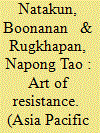

|
|
|
|
|
| Summary/Abstract |
The paper presents a case study of art activism in Nang Loeng, a historic neighbourhood in Bangkok, Thailand. Long recognised for its rich cultural heritage from food to architecture, Nang Loeng has established its name as a site of cultural tourism, drawing interest from tourists, artists, and professional experts. Like many neighbourhoods nearby, Nang Loeng today is being threatened by looming gentrification and eviction, as the inner city is transforming itself into a tourist destination. In particular, the upcoming underground construction has put their housing security under pressure. The paper first discusses the context of rail-led urban transformation in historic Bangkok, fuelled by the discourse of transit-oriented development. Then, it introduces Nang Loeng and their series of art-based programmes. Disappointed by their failure to secure housing tenure from the landlord, Nang Loeng residents have turned to activism as a tool of resistance. Here, the paper pays particular attention to the role of community architects who creatively translates neighbourhood concerns into artistic forms. Through the case of Buffalo Field Festival, the paper illustrates how the community architects, artists and local residents collaboratively use Nang Loeng's cultural assets to make subtle political statements.
|
|
|
|
|
|
|
|
|
|
|
|
|
|
|
|
| 2 |
ID:
086348
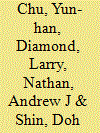

|
|
|
|
|
| Publication |
2009.
|
| Summary/Abstract |
East Asian democracies are in distress. From Bangkok to Manila to Taipei to Seoul to Ulaanbaatar, democratically elected governments in the last few years have suffered inconclusive or disputed electoral outcomes, political strife, partisan gridlock, and recurring political scandals. In 2006-2007, frustrated citizens in Manila and Taipei lost confidence in democratic procedures to the point where they tried to bring down incumbent leaders through extraconstitutional demonstrations, while a crippling political crisis in Thailand in 2006 triggered a military coup.
|
|
|
|
|
|
|
|
|
|
|
|
|
|
|
|
| 3 |
ID:
098456
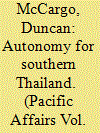

|
|
|
|
|
| Publication |
2010.
|
| Summary/Abstract |
Over 4000 people have died since 2004 in a violent conflict affecting Thailand's Malay-majority southern border provinces, Pattani, Yala, Narathiwat, and four districts of neighbouring Songkhla. Offering some form of autonomy or substantive decentralization to this troubled region might seem like an obvious response to the violence, but the topic has remained largely taboo until recently. Autonomy is seen by Bangkok in essentially pre-Cold War terms, as the thin end of the wedge, which could prefigure an unravelling of the unitary state crafted during the time of King Chulalongkorn. Nevertheless, in recent years a number of senior figures from different positions in Thai society have voiced support for alternative governance arrangements for the deep South. These have included Dr Prawase Wasi, one of the architects of the 1997 constitution, former prime minister Chavalit Yongchaiyudh, former interior minister Chalerm Yubamrung, and a number of academics. Their proposals range from full autonomy for the deep South to a national project of regionalization, as well as the creation of a new ministry to oversee the area. Prime Minister Abhisit Vejjajiva has offered mixed messages on the subject but has indicated sympathy for some form of decentralization. This article argues that despite the controversial nature of such proposals, there is a slowly emerging consensus around the need for a political solution to the conflict. In other words, Thailand is moving towards a post-Cold War understanding of autonomy as a means of preserving rather than undermining the nation state.
|
|
|
|
|
|
|
|
|
|
|
|
|
|
|
|
| 4 |
ID:
078924


|
|
|
|
|
| Publication |
2007.
|
| Summary/Abstract |
Recent years in Indonesia have seen a marked growth in the number of novels taking lesbian or gay relationships as a key if not central theme. One of the most popular of these novels has been Andrei Aksana's Lelaki Terindah [The Most Beautiful Man], published in Jakarta in 2004. The novel describes a love affair between two Indonesian men, from its first flourishing while the men are on holiday in Bangkok, to its final collapse on their return to familial and societal pressures in Jakarta. In particular, the article considers the very different portrayals of Jakarta and Bangkok from a gay male perspective: while Bangkok is painted as a modern and progressive city, Jakarta is portrayed as restrictive and limiting. In addition, the article considers the ideas of beauty and non-heteronormative sexuality as they are presented in the
|
|
|
|
|
|
|
|
|
|
|
|
|
|
|
|
| 5 |
ID:
106352


|
|
|
|
|
| Publication |
2011.
|
| Summary/Abstract |
In March 1973, a villager working for a logging concession in Northeastern Thailand was shot and killed under mysterious circumstances. The story did not make the news and would likely have been forgotten if not for another, more sensational murder-suicide a few weeks later. Working through news reports in the country's number one daily about these two crimes, this article brings to light the understudied terror and violence that plagued parts of rural Thai society preceding the mass protests against a corrupt military government in October 1973. At the same time, it analyzes how information about that violence became known, verified, and accepted as true to an urban audience in Bangkok. Tackling the issues of violence and information together, the author links the relatively abstract concepts of "knowledge production" and "justice" in a tangible case study, showing that the form that information takes and the technologies that produce it play a key role in determining its factuality. The author concludes that in Thai society today, historical truth and social justice emerge through a contingent process of documentation; without documents there is no historical knowledge and no justice.
|
|
|
|
|
|
|
|
|
|
|
|
|
|
|
|
| 6 |
ID:
101992
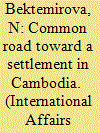

|
|
|
|
|
| Publication |
2010.
|
| Summary/Abstract |
IN JANUARY 1979, life in Cambodia started a slow return to normalcy in the new state - the People's Republic of Kampuchea (PRK). Under the impact of the 150-thousand-strong Vietnamese army, the Khmer Rouge tyranny collapsed. The world community, however, with few exceptions (the Soviet Union and the other socialist countries), which had condemned the Pol Pot regime, refused to recognize the PRK. The "humanitarian intervention" concept was still many years away: an indignant chorus demanded an immediate end to Vietnamese "occupation.''
|
|
|
|
|
|
|
|
|
|
|
|
|
|
|
|
| 7 |
ID:
117184


|
|
|
|
|
| Publication |
2012.
|
| Summary/Abstract |
The spilling of blood in modern political protest is an exceptional event. This article discusses the deployment of blood as a means of struggle by the members of an extra-parliamentary movement, known as the 'red shirts', in March 2010, in the course of their prolonged attempt to topple the government of the Thai prime minister Abhisit Vejjajiva. Two contesting discourses of blood are discussed: the symbolic discourse of blood as a self-sacrificial act deployed by the protesters to curse their enemies, and the medical counter-discourse deployed by the authorities, in an effort to neutralise the protesters' act. Several issues raised by the blood-spilling act are examined: its perceived appropriateness, its ritual roots and its disputed effectiveness as a curse. In conclusion, it is suggested that the blood ritual constitutes a reflective move to counter the prevailing 'regime of images' in Thai society.
|
|
|
|
|
|
|
|
|
|
|
|
|
|
|
|
| 8 |
ID:
135000
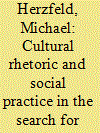

|
|
|
|
|
| Summary/Abstract |
A Bangkok community that has successfully warded off the threat of collective eviction for over 20 years, Pom Mahakan – located in the symbolically dense historic old dynastic city, next to the wall associated with the latter's foundation – has aimed at a plan of accommodation between housing rights and historic conservation that deserves serious consideration as a model for emulation. Yet the community still struggles to stay on-site; its currently dubious legal status, resulting from an ill-advised acceptance of an eminent domain order on which the community subsequently reneged on the grounds of inadequate compensation, may typify other such cases, and this suggests an urgent need for legal reform so that the authorities can ratify the community's plan and enable other communities to follow its lead. This article thus explores the wider implications of the Pom Mahakan case for social justice as well as heritage conservation in and beyond the Thai polity, taking particular account of the tension between egalitarian and authoritarian impulses that continues to characterize this nation-state and especially its political and bureaucratic life.
|
|
|
|
|
|
|
|
|
|
|
|
|
|
|
|
| 9 |
ID:
111645
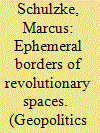

|
|
|
|
|
| Publication |
2012.
|
| Summary/Abstract |
From the Paris Commune to the Red Shirt uprising in Bangkok, revolutionaries lacking the power to overthrow their states or depose unpopular politicians have captured parts of major cities and formed their own temporary enclaves of resistance. These groups create intraurban borders by building barricades, arming themselves, and fighting to protect their space. The borders, while temporary and usually ineffective, are powerful symbols as they separate a sphere of active resistance from territory under state control. While these borders stand, they are challenges to state power - lines marking the limits of what states can control. This essay looks at how these borders arise and how they relate to more familiar types of borders. Revolutionary borders are shaped by many of the same forces as national borders, most notably globalisation, but have a distinct character that is closely linked to the changing geography of urban areas.
|
|
|
|
|
|
|
|
|
|
|
|
|
|
|
|
| 10 |
ID:
126185
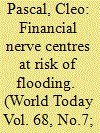

|
|
|
|
|
| Publication |
2012-13.
|
| Summary/Abstract |
Cleo Paskal on the threat nature poses to world markets
|
|
|
|
|
|
|
|
|
|
|
|
|
|
|
|
| 11 |
ID:
098542


|
|
|
|
|
| Publication |
2010.
|
| Summary/Abstract |
Energy use in Bangkok accounts for a large portion of the total energy consumption in Thailand. Few energy and carbon studies, however, have focused on the level of the city. International research indicates that cities are the key drivers of energy usage and the associated carbon emissions. This paper presents a study on the options for energy and carbon development for the city of Bangkok. The Long-range Energy Alternatives Planning System (LEAP) model is used to simulate a range of policy interventions and to predict how these would change energy and carbon development from 2000 to 2025. The planning period is assumed to start in 2005, and 2000 is used as the baseline year. Sustainability of the sixteen proposed policies and scenarios is analyzed using a multi-criteria decision-making approach. Results of this study provide an insight into Bangkok's energy and carbon future and highlight the steps required to promote a sustainable low-carbon society. The most significant energy savings are in the transport sector, where a modal shift from private passenger vehicles to mass transit systems has the potential to significantly reduce energy demand, carbon emissions, and local air pollutants.
|
|
|
|
|
|
|
|
|
|
|
|
|
|
|
|
| 12 |
ID:
098211


|
|
|
|
|
| Publication |
2010.
|
| Summary/Abstract |
Energy use in Bangkok accounts for a large portion of the total energy consumption in Thailand. Few energy and carbon studies, however, have focused on the level of the city. International research indicates that cities are the key drivers of energy usage and the associated carbon emissions. This paper presents a study on the options for energy and carbon development for the city of Bangkok. The Long-range Energy Alternatives Planning System (LEAP) model is used to simulate a range of policy interventions and to predict how these would change energy and carbon development from 2000 to 2025. The planning period is assumed to start in 2005, and 2000 is used as the baseline year. Sustainability of the sixteen proposed policies and scenarios is analyzed using a multi-criteria decision-making approach. Results of this study provide an insight into Bangkok's energy and carbon future and highlight the steps required to promote a sustainable low-carbon society. The most significant energy savings are in the transport sector, where a modal shift from private passenger vehicles to mass transit systems has the potential to significantly reduce energy demand, carbon emissions, and local air pollutants.
|
|
|
|
|
|
|
|
|
|
|
|
|
|
|
|
| 13 |
ID:
164384
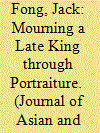

|
|
|
|
|
| Summary/Abstract |
This article employs an urban sociological reading to examine mourning portraiture in the primate city of Bangkok, Thailand, following the death of King Bhumibol Adulyadej (Rama IX). The article argues that Bangkok’s mourning portraiture constructs a reified notion of the Thai nation acceptable to Bangkok’s elites. Through a narrative that sacralizes the late king’s historical exploits for the Thai people, Bangkok’s elites have harnessed the affluent shopping district of Pathum Wan as an aesthetic and political canvas for showcasing the transcendent and virtuous nature of their late monarch. With mourning portraiture as figure and Bangkok’s Pathum Wan as background, the nationalist implications of the imagery as they render sacred the late monarch are considered. The article concludes that the capital city’s sacralization of a deceased king is but an attempt by pro-royalist banking families to reinforce their class linkages to the Thai aristocracy by ‘working towards the monarchy,’ a trajectory illuminated by Serhat Ünaldi, one which I hope to make visible in the post-death context of mourning Rama IX.
|
|
|
|
|
|
|
|
|
|
|
|
|
|
|
|
| 14 |
ID:
123272
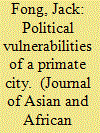

|
|
|
|
|
| Publication |
2013.
|
| Summary/Abstract |
Dynamics of the May 2010 'Red Shirts' uprising in Bangkok are examined through literature about the primate city, a city that is exponentially larger than a country's other cities. Employing news coverage of events, history about Bangkok's urban and political development, and analyses of class-based inequalities and nationalisms that the city harbors within its confines, attributes of primate city are expanded to include its perennially vulnerable political status. Such a rendering of the politically vulnerable primate city is employed to theorize how the primate city - when functioning as a national capital - is more than a large urban center, but one that collects much of the nation's hopes, dreams, and political struggles.
|
|
|
|
|
|
|
|
|
|
|
|
|
|
|
|
| 15 |
ID:
093227
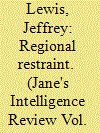

|
|
|
| 16 |
ID:
140851


|
|
|
|
|
| Summary/Abstract |
Over the past 30 years, serviced apartment complexes have become one of the defining architectural typologies of Asian urbanization. Relatively unknown before the 1980s, these complexes are designed to accommodate foreign business people, knowledge workers and students for a fixed period, typically three to six months. The rapid expansion of serviced apartments testifies to the substantial increase in the number of people who are working, training and studying outside their home countries, and provides physical evidence of the impact of these short-term populations on the urban fabric of South East Asian cities. Drawing on interviews and fieldwork conducted in Bangkok and Singapore, the paper posits shifts in the design and use of serviced apartments as a useful lens for investigating both the emergence of a geographically mobile middle class and the increase in temporary housing types to meet its residential needs.
|
|
|
|
|
|
|
|
|
|
|
|
|
|
|
|
| 17 |
ID:
154000
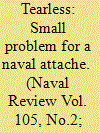

|
|
|
| 18 |
ID:
096566
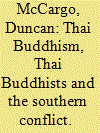

|
|
|
|
|
| Publication |
2009.
|
| Summary/Abstract |
Thailand's 'southern border provinces' of Pattani, Yala and Narathiwat - along with four districts of neighbouring Songkhla - are the site of fiery political violence characterised by daily killings. The area was historically a Malay sultanate, and was only loosely under Thai suzerainty until the early twentieth century. During the twentieth century there was periodic resistance to Bangkok's attempts to suppress local identity and to incorporate this largely Malay-speaking, Muslim-majority area into a predominantly Buddhist nation-state. This resistance proved most intense during the 1960s and 1970s, when various armed groups (notably PULO [Patani United Liberation Organization] and BRN [Barisan Revolusi Nasional]) waged war on the Thai state, primarily targeting government officials and the security forces. In the early 1980s, the Prem Tinsulanond government brokered a deal with these armed groups and proceeded to co-opt the Malay-Muslim elite. By crafting mutually beneficial governance, security and financial arrangements, the Thai state was able largely to placate local political demands.
|
|
|
|
|
|
|
|
|
|
|
|
|
|
|
|
| 19 |
ID:
089368
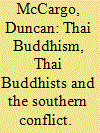

|
|
|
|
|
| Publication |
2009.
|
| Summary/Abstract |
Thailand's 'southern border provinces' of Pattani, Yala and Narathiwat - along with four districts of neighbouring Songkhla - are the site of fiery political violence characterised by daily killings. The area was historically a Malay sultanate, and was only loosely under Thai suzerainty until the early twentieth century. During the twentieth century there was periodic resistance to Bangkok's attempts to suppress local identity and to incorporate this largely Malay-speaking, Muslim-majority area into a predominantly Buddhist nation-state. This resistance proved most intense during the 1960s and 1970s, when various armed groups (notably PULO [Patani United Liberation Organization] and BRN [Barisan Revolusi Nasional]) waged war on the Thai state, primarily targeting government officials and the security forces. In the early 1980s, the Prem Tinsulanond government brokered a deal with these armed groups and proceeded to co-opt the Malay-Muslim elite. By crafting mutually beneficial governance, security and financial arrangements, the Thai state was able largely to placate local political demands.
|
|
|
|
|
|
|
|
|
|
|
|
|
|
|
|
| 20 |
ID:
098407
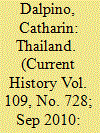

|
|
|
|
|
| Publication |
2010.
|
| Summary/Abstract |
Thailand runs the risk that future protes, a right and a mainstay of liberal democracy, will escalate quickly into violence and eventually be constricted as a matter of course.
|
|
|
|
|
|
|
|
|
|
|
|
|
|
|
|
|
|
|
|
|